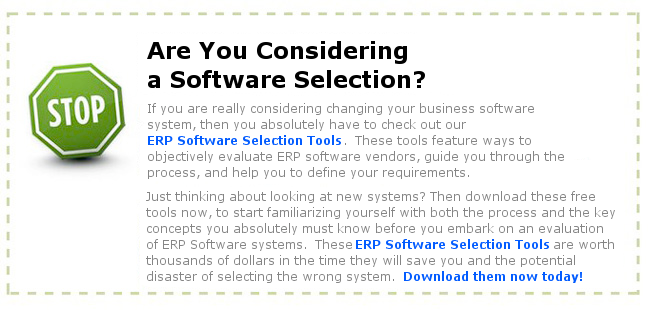What makes a successful ERP implementation?
ERP implementations are the most difficult thing you will probably have to do. They are painful and they usually tear a team apart (and then bring them back together) before going live. Some say that a major ERP implementation will go live under its third project manager! While this is extreme, it can be seen in large corporate environments. Add to the fact that ERP is not really one system; there are document management systems, bar code systems, report writers, warehouse management and other sorts of bolt-on’s. The greatest challenge is the change itself. The change to systems, processes and culture of the company are what make or break the project.
Since ERP is the central repository of information within a company, its effects (positive and negative) ripple through all levels of a company. From the strategic information that management needs to make policy decisions to the day to day warehouse transactions that the shop workers make, the ERP system touches every aspect of the business. This is one of the key reasons that it is extraordinarily complex of an undertaking. Everything that the employees do within the company needs to be examined and defined for the system. Processes need to be mapped, users need to be trained, and software needs to be validated.
In addition, there are reports to be reviewed and possibly new ones created. There are interfaces that need to be written for all of those bolt-on’s. There are data conversions that need to be mapped and tested. Oh and don’t forget the dreaded word “customization” Customizations are avoidable depending upon the flexibility of the system. If you select the system carefully before the implementation, these customizations can be eliminated or minimized. The safest method of customizing is creating an external customization to the system and trade data back and forth. The problem with this is that you will need to check the interface with each new upgrade.
All of these changes to the company shake the company at the core. However, there are things you can do to mitigate the problems that could occur with the implementation. First, you absolutely must have top management support. Management has to make the successful ERP implementation the top priority for the company. Without this support, the implementation will flounder under conflicting priorities and lack of user participation.
Factors for a successful ERP implementation
Another success factor in the implementation is getting the best user team you can put together. These people need to be the key players in each department. Wait; won’t that hurt the business operations? In the short term it can have an impact. But with the key players, you get people who know their business and can properly dictate the setup of the system and validate that the system fits the business need.
One more key area for a successful ERP implementation is to get an independent third party to manage the implementation alongside the internal project manager. This should not be the software vendor. The vendor sees the world through their tool, the ERP system. The third party project manager should be process change experts and people who have lead system implementations before. They become both your advocate and a “devils-advocate.” They are the referee to cry foul when the vendor is overstepping their bounds and they are the one who holds the internal project manager and his team accountable. They do not make policy decisions. That is for the internal team. What they do and do well, is to make sure that the system is a user driven system, not a vendor driven implementation. Make them your trusted business advisor.
Successful ERP implementation management
One more critical suggestion is that the internal project manager be a member of the operations staff, not an IT manager. ERP is not an IT project. It is a business process project. It is not a software system. It is world-class process enabled with software. Too many ERP projects have gone down the wrong path by letting the project be an IT project. ERP software is too complex and affects too many core business processes. It is key that people involved from all areas of the company take ownership. The leaders who can usually make this happen are in operations. Further, the operations department understands the business drivers better than IT.
These are but a few of the key strategies for a successful ERP implementation. As mentioned before, use a trusted ERP advisor. Follow their advice. They can and will guide you if you listen. Dig into their knowledge for other implementation tools and lessons learned. Doing so early will help make your project a lot less painful and let it achieve a higher degree of success.
What makes a successful ERP implementation?

Normally I wouldn’t comment on posts but I felt that I had to as your writing style is actually good. You have broken down a tough area so that it easy to understand.
_________________________
warehouse software